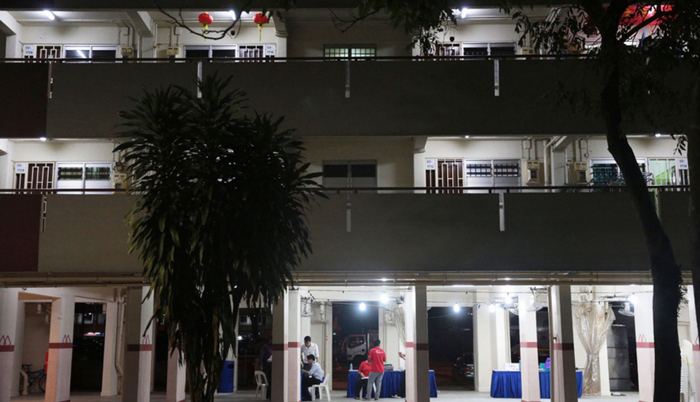![]() Home > Singapore
Home > Singapore
6 TB Cases Found at Ang Mo Kio Block

TB screening stations have been set up at the void deck of Block 203 Ang Mo Kio Avenue 3, where a cluster of drug resistant tuberculosis cases being investigated by the MOH are residing, on 15 Jun 2016. | PHOTO: Jason Quah/TODAY
![]() June 16th, 2016 | 07:32 AM |
June 16th, 2016 | 07:32 AM | ![]() 1485 views
1485 views
SINGAPORE
In an unusual situation, a cluster of six multi-drug-resistant tuberculosis cases has emerged at a Housing and Development Board (HDB) block in Ang Mo Kio, although some of them did not know, or interact with, the others, leaving unexplained how the disease could have spread.
As a precautionary measure, the Ministry of Health (MOH) is breaking away from the usual routine screening approach — where only close contacts are screened — and will provide free on-site TB screening to residents of Block 203 Ang Mo Kio Avenue 3.
But MOH director of medical services Benjamin Ong said at a media briefing yesterday that these cases do not pose a public health risk, and there is no compelling need for the authorities to change the usual approach of contact screening of TB patients.
All six patients — aged from the early 20s to 70 years old — are Singaporeans. The first one was diagnosed in February 2012, and another member of his household was diagnosed with the disease in May that year.
A third member of the household was diagnosed with latent TB — TB in its asymptomatic, non-infectious state — but did not develop active multi-drug-resistant tuberculosis (MDRTB) until October last year.
Meanwhile, the other three people living in the same block were diagnosed in April 2014, October last year, and last month. Among them, only one lived on the same floor as the three cases from the same household.
MDRTB cases are more serious as they are more resistant to the two most important drugs used to treat TB. Treatment takes longer — up to 20 to 24 months instead of six to nine months — because less-effective medicines have to be used.
The cluster is “highly unusual” as TB transmission typically requires close and prolonged contact with an infectious individual.
In this case, other than the three patients living in the same unit, the rest did not know, interact with one another or congregate at the same common areas.
The MOH said a “vigilant doctor” — Dr Cynthia Chee, senior consultant at the Tuberculosis Control Unit at Tan Tock Seng Hospital (TTSH) — had first observed the cluster of cases involving the residents at Block 203.
The matter was reported to the MOH last month, leading to an investigation that established that the six individuals were infected with the same MDRTB strain. The latest case was confirmed on June 10, but the route of transmission for the unrelated patients is still unknown.
There are more than 350 residents in about 160 units at the block. While the lift is a common facility used by the residents, Dr Sonny Wang, director of TTSH’s Tuberculosis Control Unit, noted that the possibility of TB transmission through the lift would be “quite remote”.
Although TB can be spread through the air, such as when an infected person coughs, transmission requires close and prolonged contact over “days and weeks”, rather than “minutes to hours”.
For example, studies have shown that no one on a flight of less than eight hours sitting within two rows of an active TB patient has contracted the disease, said MOH director for Communicable Diseases Jeffery Cutter.
Yesterday, Associate Prof Ong assured members of the public that the six individuals — five men and one woman — are “not an ongoing public health risk”, where three have completed treatment while the other three are undergoing treatment.
He added: “The risk of transmissions to persons who are not close contacts remains very low ... All these six cases are no longer infectious and cannot transmit MDRTB.”
Their family members and close contacts have also been tested for TB. Some have latent TB and the MOH will monitor them.
The MOH began informing residents of the affected block yesterday evening, with officers making door-to-door visits.
A Sata CommHealth bus — where the on-site screenings will be done — was seen parked near the block.
The screening, which is not mandatory, begins today and runs till Sunday. Those unable to can also visit any Sata CommHealth clinic till June 30.
Thereafter, they can make an appointment at TTSH’s Tuberculosis Control Unit. The screening is also open to those who had lived in the block from July 2011.
Assoc Prof Ong said that screening is not compulsory as it is difficult to compel people who are well to undergo screening. “We have to balance a person’s personal needs and rights versus whether or not there is a public health risk,” he added.
While this cluster got them rethinking about the way they approach the screening of the close contacts of TB patients, he added that, at present, there is no compelling need to change the screening practice.
There were 1,498 new TB cases among Singapore residents last year, of which less than 1 per cent are MDRTB cases.
In 2013, a cluster of six cases of MDRTB emerged, and it was traced back to three cybercafes at Parklane shopping mall.
Source:
courtesy of TODAY
by Siau Ming En
If you have any stories or news that you would like to share with the global online community, please feel free to share it with us by contacting us directly at [email protected]